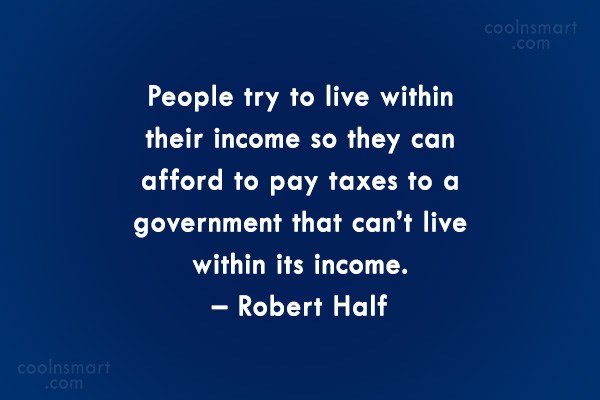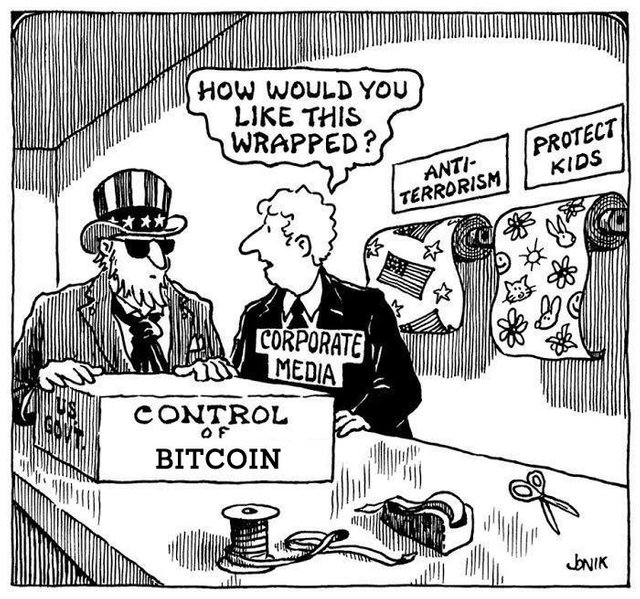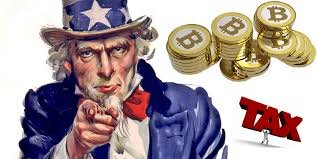Explaining Money, Bitcoin And Taxes To My Friends
Since getting involved in cryptocurrencies like Steem and Bitcoin, it has come to my attention how little people truly understand money and its functions in society, especially in countries like the United States where the illusion of economic stability is strong.
You can read more about the history of money here.
I was talking with a friend of mine about Bitcoin and this led to a comparison of the Bitcoin economic system with the Federal Reserve system when it became clear they didn't even understand how that system works. I was surprised because she owns multiple apartment rentals and has a good understanding of finance but still didn't get how money is created.
Most people have no idea how money is created out of thin air by the private, Federal Reserve bank and loaned to our government with interest. The money is literally created by creating debt that the government and its citizens must pay back with interest. What they don't understand is that the interest is not created along with the debt.
This puts the citizens in direct competition with each other, creating winners and losers.
As an analogy, imagine four people playing the board game Monopoly and that these four players represented the entire world economy. Now imagine that the money received by the players had to be paid back to the bank with interest, but the money needed to pay the interest does not exist in the game.
The only way anyone could pay back the bank is if they take money from the other players so they could win, but in doing so, ensuring the players they get that money from will lose.
Now imagine that one of the players, we'll call them the government, had another Monopoly board and it's money available for them to play with in the same game. They could borrow as much or all of it at will and the interest they pay on that money could be collected as taxes from the other players. Who would win that game? The government, of course.
This is essentially our economic system as it is today. The tax the other players pay, we'll call them the citizens, is collected and paid to the government and literally funds that government and ensures that they will win and the citizens will lose.
The interest collected is coming from the same money pool the other players are in debt to repay creating a certain win-lose situation.
When people lose, they are forced to sell their assets for pennies on the dollar and this creates a huge opportunity to the winners holding all the cash, who buy those assets for a fraction of their real worth. That's why the rich get richer and the poor get poorer.
If you were one of the winning players, it would be in your interest to purposely create these boom or bust cycles as you could acquire more assets at bargain prices. Instability would be profitable to the ones holding the cash.
Money is better than poverty, if only for financial reasons
Explaining this to people sometimes have angered them and leads some to accuse me of being un-American which I find truly strange.
Prior to the United Sates fighting for our independence from the British, one of the key areas of friction between the Crown and the colonies was the excessive taxation without representation that the Crown levied on the colonies.
The famous Boston Tea Party was a revolt to refuse to pay taxes levied on imported tea that the colonists felt were unfair and we started cultivating our own tea as a response and refused to drink imported tea. All of this eventually led to the Declaration Of Independence
The Declaration of Independence, in addition to calling for peace in our country, called for four basic things: the right to pass our own laws, to operate our own courts of law, to trade with other nations, and to create our own tax system. Simple, elegant, complete. No wonder we still read it.
Somewhere in our evolution as a country, the government have given away its constitutional powers to a cartel of private banks, have borrowed an unpayable amount of money and have sent the interest bill to be paid by its citizens.
The Constitution contains only two sections dealing with monetary issues. Section 8 permits Congress to coin money and to regulate its value. Section 10 denies states the right to coin or to print their own money. The framers clearly intended a national monetary system based on a coin and for the power to regulate that system to rest only with the federal government. credit
We have given our sovereign right to print money away to these banking cartels and our citizens and future citizens are obligated to pay it back.
This is an extreme example of taxation without representation as one could imagine and it would be un-American to not protest it.

We have somehow been led to believe that paying taxes is a patriotic duty and I contest just the opposite. Taxes should only be paid voluntarily and only for as long as needed to fund specific projects or civic services. Blockchain technology could prove to offer useful applications for funding many projects for social good.
Taxes can be used as a tool to further the public good, but what makes our Federal Reserve system and its ability to digitally print money as debt so deceiving, is how little it is understood by the people using it and the hidden tax of inflation that we, as citizens, pay with our labor.
The more governments "print" money the less value it has. I've discovered this is another concept many people don't seem to understand and in my attempts to clarify this point, I've found another analogy useful.
Imagine if water was money. Would that money, water, be more valuable in a drought or a flood. Obviously in a drought, right? The less water available, the more value it has. If water was available everywhere, as in a flood, it would have less value as money.
The same holds true with currency. The more the government borrows into existence as debt, the less value it has.
That is why things cost more today than they did in the past and we have no control of the debt issued by these banks, we only have the obligation of repaying that debt fostered upon us and the next generation without our consent. This is taxation without representation, something our constitution went to great lengths to protect us from.
There is no better way to assert our patriotism than to resist this assault on our liberties.

Humans are an interesting species. We have a history of adopting many new technologies that are hailed as our salvation from whatever problem they were designed to solve which eventually prove to be our oppressor as well.
Bitcoin, I imagine, will be no different. While is solves many of the problems associated with fiat currency, it could also prove to be oppressive, specifically the concerns that governments could adopt the blockchain technology, but attempt to make it more centralized and the openness of the platform could be used to pry into or even police spending.
Governments could also adopt a version of bitcoin, let's call it GovCoin, lifting the finite amount on how much is printed, putting its citizens in the same situation it finds itself in today, namely, in debt to hidden taxation without representation.
With the recent economic instabilities spreading through various countries throughout the world and threatening the value and trust of their respective, national currencies, the adoption of cryptocurrencies and their perceived values could be playing into the hands of the central banks exactly as they have planned all along.
What better way to spread the adoption of a world currency than to have the masses adopt its use as an act of rebellion against their oppressors, only to have it eventually become centralized once again, this time on a global scale, by a controlling authority, once everyone is using it.
I believe the term used to describe this tactic is "governing from the bottom up"
What are your thoughts?
Related posts
Bitcoin Vs Gold - Why I Believe Bitcoin Will Pan Out To Be More Valueable Than Gold
How Blockchain Technology Can Help The Internet Of Things
Programmable Trust For The Internet Of Things How Bitcoin Is Transforming The Way We Do Business
Bitcoin Vs Banks Technological Disruption Can Revolutionize Banking
Five Ways Smart Contracts On A Blockchain Are Changing The Way We Do Business
Blockchain Is Killing The Middleman Real Trust In A Virtual World
Today I Learned More About Bitcoin And Blockchain Technology


A few points of contention, in brief:
I'll agree that taxes are immoral if you disagree with the project of government, and that governments have a very unstable relationship with private finance companies, and corporations at large.
Perhaps I should clarify to your point.
The players are in competition with each other to pay the interest which was not brought into existence with the loan. This means someone must lose.
Yes, there is interest paid on money the moment it is created by a bank.
There are many factors for inflation including the ones you mentioned but the biggest increase comes from putting more currency into existence. The more scarce it is, the more value it has. The opposite is true, the more money in the system, the less you can buy with it because it has less value.
If by interest then you mean taxes, I still don't think it holds up. Taxes are adjusted based on your earnings and assets, both liquid and not. This is supposed to make things fairer, so that taxes are paid relative to ability to pay, but of course it's one of the great scandals of our times that things move in the opposite direction. In our system today, those that lose are the ones who have least available to pay taxes with.
So the common sense idea of only paying your fair share based on your assets is in conflict with the common sense idea that those who worked hard should be able to hold on to the wealth they created. The former is seen as a relic of the left, the later progress policy of the right, which will now gain even more currency (if you pardon the pun 🤤 😜) with Trump as president. As always in an oligarchy, the losers are the least powerful.
If however you mean interest as a payment to be paid on a loan between federal reserve and government, I think this is a gross oversimplification as they work together. Any animosity between them is purely political smokescreen.
For the record I think your best point is to watch out for those who have large stakes in the status quo (i.e. the government administrators and those who benefit from them) to co-opt innovations like Bitcoin, etc., and this must be resisted strongly. GovCoin would be terrible.
This is what I mean and also between a bank and citizen. My point though is that the money needed to pay back a loan with interest is not put into the economy when the loan is made. Only the priciple is entered into circulation. This means the interest has to come from another player, citizen, business or government, depending on the scale of the loan. There's not enough to pay all debts plus interest without someone losing. It's financial, musical chairs.
True enough, it's all ridiculous musical chairs. Interesting discussion 😉 I see what you mean better now. Looking forward to more articles.
Thanks for helping me clarify my point and feeding my thoughts with good points of your own and thanks for reading my post.
I see you edited you answer, so just to respond to your last point again, it doesn't matter if the currency is slowly devalued if there is more of it to go around, i.e. if saving grow with interest and wages go up. Holding on to money "outside the system", i.e. under the mattress, would be a problem though. I can't say it enough, it's a wages vs. production profit problem, not inflation.
and
let's just say I disagree with that.
Fair enough! 😑
This post has been linked to from another place on Steem.
Learn more about and upvote to support linkback bot v0.5. Flag this comment if you don't want the bot to continue posting linkbacks for your posts.
Built by @ontofractal